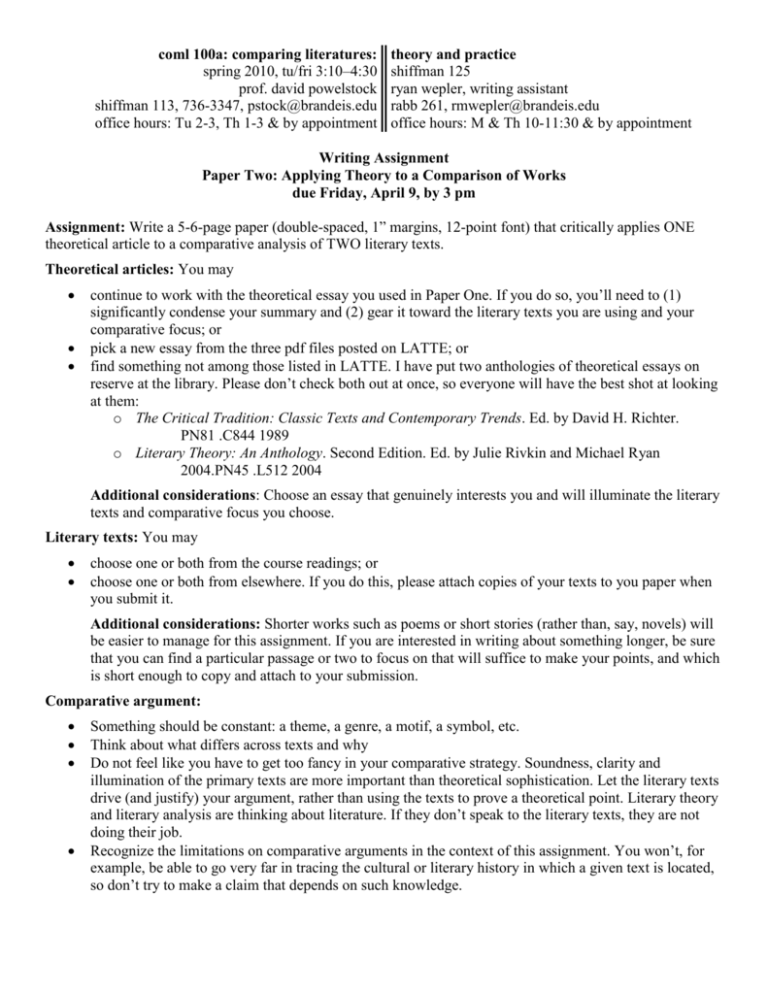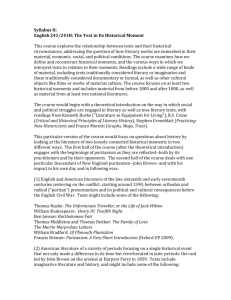doc
advertisement

coml 100a: comparing literatures: spring 2010, tu/fri 3:10–4:30 prof. david powelstock shiffman 113, 736-3347, pstock@brandeis.edu office hours: Tu 2-3, Th 1-3 & by appointment theory and practice shiffman 125 ryan wepler, writing assistant rabb 261, rmwepler@brandeis.edu office hours: M & Th 10-11:30 & by appointment Writing Assignment Paper Two: Applying Theory to a Comparison of Works due Friday, April 9, by 3 pm Assignment: Write a 5-6-page paper (double-spaced, 1” margins, 12-point font) that critically applies ONE theoretical article to a comparative analysis of TWO literary texts. Theoretical articles: You may continue to work with the theoretical essay you used in Paper One. If you do so, you’ll need to (1) significantly condense your summary and (2) gear it toward the literary texts you are using and your comparative focus; or pick a new essay from the three pdf files posted on LATTE; or find something not among those listed in LATTE. I have put two anthologies of theoretical essays on reserve at the library. Please don’t check both out at once, so everyone will have the best shot at looking at them: o The Critical Tradition: Classic Texts and Contemporary Trends. Ed. by David H. Richter. PN81 .C844 1989 o Literary Theory: An Anthology. Second Edition. Ed. by Julie Rivkin and Michael Ryan 2004.PN45 .L512 2004 Additional considerations: Choose an essay that genuinely interests you and will illuminate the literary texts and comparative focus you choose. Literary texts: You may choose one or both from the course readings; or choose one or both from elsewhere. If you do this, please attach copies of your texts to you paper when you submit it. Additional considerations: Shorter works such as poems or short stories (rather than, say, novels) will be easier to manage for this assignment. If you are interested in writing about something longer, be sure that you can find a particular passage or two to focus on that will suffice to make your points, and which is short enough to copy and attach to your submission. Comparative argument: Something should be constant: a theme, a genre, a motif, a symbol, etc. Think about what differs across texts and why Do not feel like you have to get too fancy in your comparative strategy. Soundness, clarity and illumination of the primary texts are more important than theoretical sophistication. Let the literary texts drive (and justify) your argument, rather than using the texts to prove a theoretical point. Literary theory and literary analysis are thinking about literature. If they don’t speak to the literary texts, they are not doing their job. Recognize the limitations on comparative arguments in the context of this assignment. You won’t, for example, be able to go very far in tracing the cultural or literary history in which a given text is located, so don’t try to make a claim that depends on such knowledge. 2 Your paper should: 1. 2. 3. 4. summarize the most important concepts and arguments of the article for your topic; specify the particular relevance of the article’s ideas for your texts and topic; demonstrate the relevance; and provide a final assessment of what is gained by using the article you used. (Be honest about its limitations, too.) Pay particular attention to the following criteria: 1. Be concise and efficient in your use of the theoretical article: identify the central points of the article’s argument relevant to your topic, and don’t waste time on digressions, detailed discussions of the examples it uses, or on aspects of the article that aren’t important for your topic; 2. Integrate theoretical and interpretive elements; show how the theory illuminates the comparison; 3. Use your own words as much as possible: there may be key technical terms that the article uses that you want to use. You should identify and define these. Otherwise you should recast the arguments in your own language (the keyword and summary methods we’ve practiced should be helpful in this regard); and 4. Maintain the distinction between your own voice and that of the author of the article you are summarizing: this will be crucial when you bring multiple scholarly viewpoints together in your final research paper, but success in that endeavor depends on practicing this skill at every stage of research, from your first jottings in the margin of the target article to the final product. Feel free to discuss your papers with DP or RW! The paper is due by the start of class on Friday, April 9. Please email your paper in Word (.doc) or RTF (.rtf) format to both rmwepler@brandeis.edu and pstock@brandeis.edu by then. Please also post it to your ePortfolio as full text (i.e., not as an attachment).





